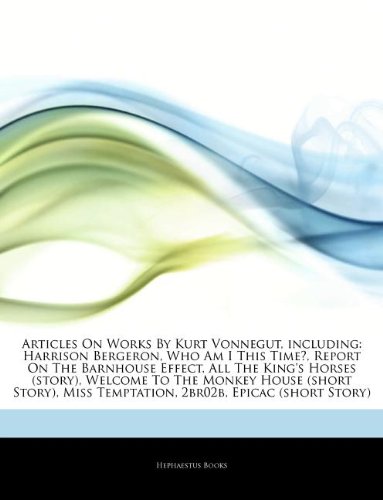All Nonfiction
- Bullying
- Books
- Academic
- Author Interviews
- Celebrity interviews
- College Articles
- College Essays
- Educator of the Year
- Heroes
- Interviews
- Memoir
- Personal Experience
- Sports
- Travel & Culture
All Opinions
- Bullying
- Current Events / Politics
- Discrimination
- Drugs / Alcohol / Smoking
- Entertainment / Celebrities
- Environment
- Love / Relationships
- Movies / Music / TV
- Pop Culture / Trends
- School / College
- Social Issues / Civics
- Spirituality / Religion
- Sports / Hobbies
All Hot Topics
- Bullying
- Community Service
- Environment
- Health
- Letters to the Editor
- Pride & Prejudice
- What Matters
- Back
Summer Guide
- Program Links
- Program Reviews
- Back
College Guide
- College Links
- College Reviews
- College Essays
- College Articles
- Back
Harrison Bergeron by Kurt Vonnegut
“Harrison Bergeron” is a dystopian short story written by Kurt Vonnegut in 1961. In the story, Vonnegut writes of a time where “everybody was finally equal” (Vonnegut 1). The story focuses on Hazel, George and Harrison Bergeron. George and his son, Harrison, are both extremely strong and intelligent. But being superior in any way shape or form is prohibited by the government; therefore the father and son are given “handicaps” which hinder their strength and thought process. However, due to his massive structure and advanced thoughts, no handicap is strong enough to affect Harrison. The Handicap General’s men take Harrison away for he is thought of to be a threat to the ways of society. One evening, Harrison’s parents are watching ballerinas on the television when suddenly, the show is interrupted by a newsbreak announcing that Harrison has broken free and is on the loose. Abruptly, Harrison appears on the screen and begins referring to himself as “the Emperor” (Vonnegut 5) and selects a ballerina to be his “Empress” (Vonnegut 5). As Hazel watches from her living room couch, Diana Moon Glampers, the Handicap General, shoots and kills Harrison and the ballerina. George, who had left the room during the incident, returns to find his wife with tears on her face. He asks why she was crying. She responds that she had seen “something sad” (Vonnegut 6). George tells her to forget sad things and she assures her husband that she “always does” (Vonnegut 6). The central idea of “Harrison Bergeron” is that if equality is forced, then humanity is stunted.
Handicaps are a straightforward example of how equality is forced. Vonnegut writes that in this new society, “Nobody was smarter than anyone else. Nobody was better looking than anybody else. Nobody was stronger or quicker than anybody else.” However, equality of performance cannot be forced, because when it is, society loses sight of any sort of sentiment or feeling. Common wisdom dictates that there is no bond stronger than the bond between a mother and her son. When Hazel refers to her son’s death as “something sad,” Vonnegut demonstrates that, in this imagined society, all emotionality and compassion has been lost and humanity itself is in a state of no progression.
Similar Articles
JOIN THE DISCUSSION
This article has 1 comment.

